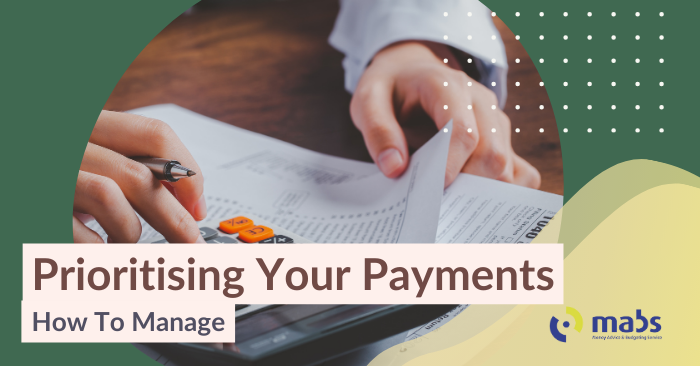Prioritising your Payments – How to Manage

Are you facing annual bills such as car or home insurance? Perhaps back-to-school costs are making it more difficult to make ends meet.
So, what happens when we just can’t stretch any further? By acting early, you can reduce stress and have a plan in place.
At MABS, we help not only those who have problem debt but also help people reduce their chances of having problem debt in the first place.
In this blog, we talk about prioritising your payments. Let’s get started…
What are priority payments or debts?
A priority debt is a bill or payment that can impact your life negatively if you don’t pay it or fall behind on payments. Examples of priority payments are:
- your mortgage or rent,
- utilities – electricity and heating,
- TV licence,
- car insurance,
- car loans, including Hire Purchase or a PCP (personal car plan),
- income tax,
- property tax,
- fines, or
- maintenance payments.
Falling behind on these essential payments can result in repossession of your home or car, evictions, disconnections or fines.
Mortgage and rent are particularly important because you could lose your home if you do not pay them.
If you are already in arrears on your mortgage, read more about Abhaile and how it can help you keep your home.
What are secondary debts?
Secondary debts are other types of payments where the consequences of arrears are less serious. For example, they can’t take your home. Just because these debts or payments are less serious, you shouldn’t ignore them – you can still be taken to court if you don’t keep up the agreed payments.
Examples of secondary debts are:
- bank overdrafts,
- legal moneylender and catalogue debts,
- credit card debts,
- credit union loans, and
- personal loans.
So, which debts should I pay first?
We recommend that you pay off your debts in the right order, starting with priority debt first. You can read more on the MABS money advice approach, but you should start by:
- Assessing your situation: What is coming in and going out? Do you have any additional money to pay any arrears?
- Decide on a plan – MABS can help if you don’t know where to start or are getting overwhelmed by the process. Contact an adviser to support you through the process.
- Present the repayment plan to your creditor/s
- Review your situation – is the new plan working, and has your situation changed?
If you are considering a formal debt solution under personal insolvency, the order and repayment amounts will be fixed as part of this arrangement.
MABS approach to prioritising your debts
Deal with priority debts first
If you have fallen behind on payments or bills, you will need to offer your creditors an affordable amount – on top of your regular payments – to clear the arrears over a fixed period.
When working out your budget, if possible, don’t use all your allocated money to pay down your arrears. You need to pay your secondary debts, too.
Deal with secondary debt next
Where you have the room left in your budget, not leaving yourself below the Reasonable Living Expenses guidelines. The easiest way to split the amount between debts is to allocate the largest amount to the largest debt and move down the list that way.
Other Approaches to Tackling Debt
There are many ways to tackle your debts. One might suit you and how you manage your finances better than others. Choosing one that fits your budget and mindset will be essential to sticking to your plan.
Where to get free help and advice
If you’re already in arrears or are struggling with debts, talk to a money adviser as soon as possible. You can call the MABS National Helpline on 0818 07 2000 Monday to Friday, from 9am to 8pm or find the contact details for your local office.
Disclaimer: This blog does not represent legal advice and is intended for guidance only. If you are concerned about your current or future personal financial situation, then please contact an adviser from MABS. Advisers are available by phone, email and in-person in locations nationwide.
Note: We welcome references to and use of the content in this blog. However, please reference MABS and link said content if you choose to do so.




Facebook
twitter
Instagram